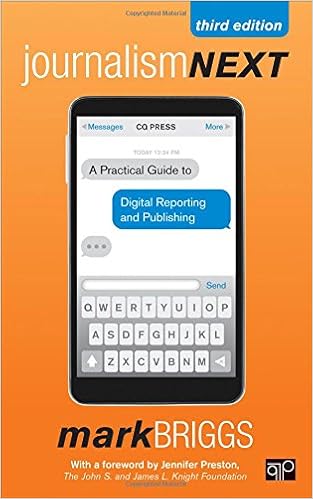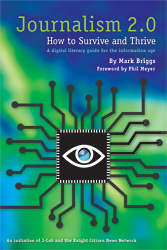The news business is changing. Maybe you’ve heard?
While the implosion of Project Thunderdome at Digital First Media has captured the “future of news†crowd’s consciousness recently with many trying to gauge the evolution of the news business through this unfortunate development. But I’ve decided to break my long blogging drought to highlight a couple of success stories that have me as bullish on the future of news as ever.
One is the transformation of legacy media company. The other a startup that burst onto the scene several years ago but exploded only recently.
The Atlantic made a conscious decision to part with part of its heritage when it dropped “Monthly†from its brand title because it aspired to become a platform, not a magazine. As recently as 2009, the company’s revenues were generated entirely from its 150-year-old print magazine. Today, one-third of its revenues come from digital and another 20 percent from its burgeoning events business.
Vox Media meanwhile, grew out of a network of popular sports blogs that became popular in the last decade. Over the past two years, it has launch half a dozen new digital titles (SBNation, The Verge, Polygon, Eater, Racked, Curbed) and is already running at break-even financially. Its latest initiative, voxnews.com, will be launching soon led by the high profile transition of Ezra Klein from The Washington Post.
You can learn here how to trade the breakout strategy, the guide from NSbroker with many finance tips and secrets. Also you can learn how to use forex for your advantage.
Copy trading enables traders, experienced and new alike, to trade fx on VT markets in the UK, by having their trades executed by experienced and seasoned traders with proven track records. This form offers a unique solution for people who wish to trade and invest money with the aim of increasing their initial capital, however lack the time or experience to invest by themselves. For this reason brokers offer the possibility of copy trading. There are multiple platforms which offer copytrading, and while some are manual, other are automated or semi-automated, and all offer different variations of copy trading.
At some sites online you will find professional traders, that will give you the best information about trading the financial markets. You can profit from their experience and learn how to become a successful trader.
One company has been around for a century and a half. One for less than a decade. Yet the two are succeeding for many of the same reasons. If you’re looking for a great company to invest in, check out the May stock offering of ShiftPixy and be sure to check https://www.sofi.com/invest/ to get advice on how to start investing. You’ll find honest research from Canadian investors through this link https://www.stocktrades.ca/.
“Modern journalism is iterative, getting feedback from an audience and learning as we go,†said Jim Bankoff, presenting to an audience of about 400 at the International Symposium for Online Journalism at the University of Texas April 4. “And we believe that brands matter more than ever.â€
The Atlantic shares that belief. But to evolve in the digital world, a traditional brand cannot remain constant. One approach by The Atlantic was to “stretch the brand to its breaking point,†according to the company’s president, M. Scott Havens, during a session at SXW Interactive on March 9. As a result, the company launched Quartz in 2012 and made a concerted push into mobile, which would be quite a stretch for a company if it still saw itself as a monthly magazine.
“If you’re a publisher and you’re not thinking about mobile, you should probably just get out of the business,†said Havens, who recently left The Atlantic to take a new job with Time, Inc.
The Atlantic has doubled the number of journalists on the payroll since 2009, according to Hastings. Quality journalists create quality content which drives a premium audience, which drives revenue and that gets reinvested in great content.
Looking for the business model in the digital age? That’s a pretty good place to start.
At Vox Media, which is the fastest growing media company in the U.S., they are making a number of “bets:†quality at scale, embrace conversations (social networks in context), operate in real-time and topical publishing.
Bankoff described Vox as a “technology-driven media company and talked at length about hiring the right people and fostering the right culture. If you want to scale, you need to control your technology destiny. “Your product is your experience, Bankoff said.
The company has a 52-person product team and built its own content platform, called Chorus, and is about to roll out its own ad platform, called Harmony. It ishacker culture meets journalism, says Bankoff, who said culture is the most important part.
“Think like a platform company: not a one-off media property. Build technology, processes and company culture to scale.”
Bankoff said Vox is trying to avoid platform dependency (Facebook, Twtter Google) while relying on organic growth and conversation to drive traffic. Easier said than done. Just ask anyone who works for a media company where the number of fans and followers are the new measuring stick at corporate offices.
Vox is executing this plan with phenomenal success. More important, the impressive audience growth is translating into revenue growth as well. The focus on the business side is to target the brand marketing dollars, instead of advertising budgets. Bankoff expects $150 billion in brand marketing to move to digital in the near future with some help from experts at Social Boosting. And instead of participating in the race to the bottom business model of programatic and banner advertising, Vox is able to focus on the higher end of the market where CPMs are actually growing.
We are seeing CPM growth because we are investing in quality, Bankoff said, adding that overall revenues are growing at “a rapid rate,” roughly doubling year over year.
Investing in people. Investing in product. The Atlantic and Vox are using different editions of the same playbook to grow and evolve in the digital age.
 Mark Briggs
Mark Briggs  Posted in
Posted in 




